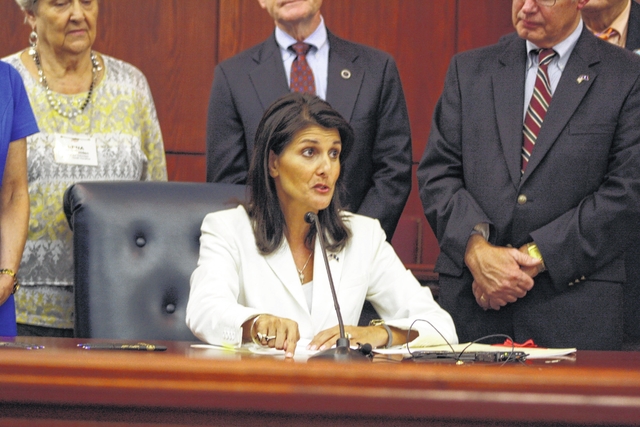




EASLEY — The governor of South Carolina made history last week when she traveled to Easley to sign into law a bill leading to more transparency in state government and to give a nod to the local legislator who was instrumental in making it all happen.
“The reason we are here, I have to say, is because of Sen. Larry Martin,” Gov. Nikki Haley stated before putting her name to the new legislation. “It’s the old guard versus the new guard and Larry Martin fought with the new guard to help bring ethics reform to the state. Imagine the work it took to get the legislation passed where legislators now have to show where their money comes from, and that is any elected official in South Carolina.”
Haley made the trip to Easley to sign into law two bills leading to independent investigations and private income disclosures for elected officials.
With the implementation of independent investigations, a State Ethics Commission is established. The old system of legislators providing investigations of ethics violations is now replaced by an independent group who will also make all findings of probable cause to the public.
With private income disclosures requirements now law, all public officials and their immediate families are now required to disclose the sources of their private income that appears on their tax forms. This legislation is intended to remove any conflicts of interest for the public to make its own determination if the official is acting in his or her own interests or the interests of their constituents.
Haley also acknowledged the work of the Coastal Conservation League, AARP, and the League of Women Voters in the effort to see ethics reform.
According to Martin, it was a long time coming.
“This has definitely been an uphill battle. At one point I was having to work to stall my own bill a couple of years ago when an amendment had been added which pretty much made the bill useless. But we didn’t give up, we just went back to work on it,” Martin said. “It took four years but we’re finally bringing it home.”
According to Haley, Martin’s work, along with others involved throughout the entire process, was leading South Carolina to more open government.
“We are the 47th state to enact income disclosures for its public officials and this is going to help make our state more transparent,” Haley said. “When you include the independent investigations portion of this, it sends a message to the old guard this is the new way of doing business in Columbia.”
